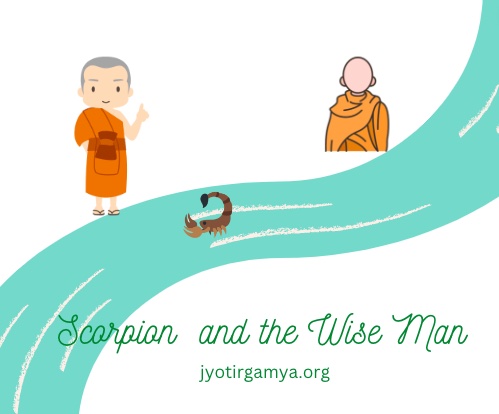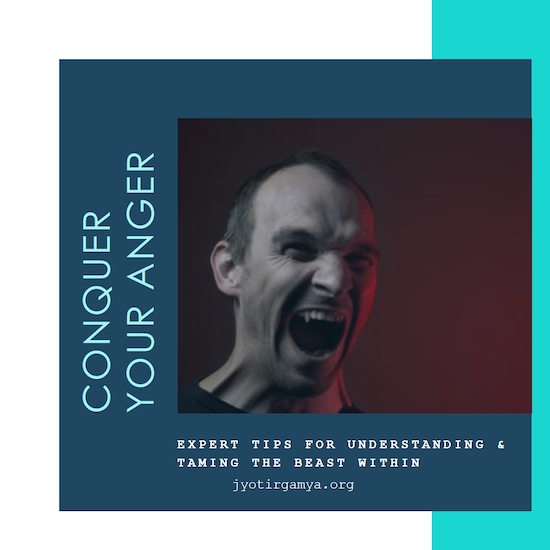Scorpion and the Wise Man : Expert Tips for Understanding & Taming the Anger Within
Story
A wise man named David was once cooling off along the banks of a river with one of his friends, Jack. David spotted a scorpion struggling to float. He dived into the river, got hold of the scorpion, and shuffled towards the bank.

The scorpion, being itself, stung him. David cried out of pain and lost his balance. Meanwhile, the scorpion dived back into the waters and resumed its drama.
Jack asked David, “Why did you pick the scorpion up, knowing it would sting?”
To Jack’s surprise, David ventured to pull the scorpion again from the water.
Jack was sure the scorpion would sting, so he asked David, “Isn’t it agonizing? It is futile to feel compassion for such a cruel creature.”
David reverted, “The scorpion is struggling and requests help.”
As David lifted the scorpion, the queen of deception injected venom and escaped into the river. David turned his way towards the bank of the river.
“Ain’t you going to lift the scorpion again?” asked Jack.
David smiled back and reverted, “The scorpion’s natural disposition was to sting everybody who approached it; I offered it two chances to escape from the angry waters.”
Jack appeared puzzled and asked, “Why did you not attempt to save the scorpion for the third time?”
David reverted, “Let people fool you only once, never twice. Offer always a second chance, but never a third!”
David kept quiet momentarily as Jack reflected on what he just heard.
Not reacting to immediate circumstances and keeping a cool head helps us make the right decisions.
It also allows us to keep doing good and prevents us from anyone who intends to exploit the goodness within us.
Introduction
Anger. It simmers, it boils, it explodes. We all experience it, but for some, it becomes a disruptive force in their lives. Fear not, fellow travelers on the emotional rollercoaster! This article delves into the world of anger, offering expert guidance on recognizing, managing, and, ultimately, harnessing its power.
This article begins your journey towards a calmer, more empowered you. It will help you transform anger from a foe into a friend. So, stay tuned, and let’s embark on this journey of self-discovery together!

Expert Opinion
Regarding Anger Management, I recommend noticing what your trigger is, and this can be done by seeking out a therapist and working on introspection. In general, ask yourself, where and when does my anger spike? Do I have a negative experience related to this trigger from my past? And think about these things before your anger is initiated.
Secondly, I recommend you pause when anger strikes, directly related to the STOP intervention from dialectical behavior therapy. Think of the situation from an outsider’s perspective and think of your goal. Think of how you can achieve your goal of either stating what you need to say or getting an outcome from it, and think of the words you need to use for that outcome to come to fruition.
Lastly, take a moment to breathe during that pause. Do some meditation: focus on your breath, inhale and count to 5, hold your breath for 7 seconds, and release the breath from your mouth and count to 9. Some stretching can also help, such as a stress ball or anything that can distract you from the anger.
Return to the situation with a stable mind. Move forward with the action and what you were trying to achieve.
There are many other suggestions a therapist or qualified mental health professional can give you in case you need other ideas that may help you. Anger is a form of frustration that usually comes out when our feelings are not heard or we may be misinterpreted. Anger can also come out when a boundary is crossed. It is a normal emotion, but maladaptive responses such as hitting, screaming, and throwing things are what one must be aware of with anger responses.
I might be curious about what’s underneath the anger. Anger is a secondary emotion in psychology, and it can sometimes be a sort of protection from feeling another, possibly more painful, emotion. Perhaps sadness, for example. And then work with the sadness, and the anger might dissipate.
Anger is incredibly misunderstood. It has negative connotations and is often mistaken for aggression, abuse, and violence. It is on a continuum, and we must be connected to feelings such as frustration, irritability, and anger. This alerts us to a rupture in the connection and a possible boundary breach. If this is not understood, we run the risk of either reacting or suppressing our feelings. A healthy relationship with our anger keeps us connected to our physiological protective responses, which is fundamental to our health and well-being.
“Anger is an emotion that all human beings feel; just like we feel happy, sad, hopeless, loved, etc., it is mighty. One uses it when feeling helpless, sad, weak, or inadequate. It helps the person feel powerful. To understand the why better, we can compare anger to fire; if used wisely, we can cook our daily meals; however, if left unattended or wild, it can burn the house down.
Similarly, when used appropriately, anger can be protective and helpful and, when used blatantly, may ruin relationships.
To handle anger issues effectively, anger management techniques are used by therapists to help clients learn healthier ways of handling their anger.
Specific tips that help in anger management are:
Thinking before you speak
Calm down before responding.
Don’t look to assign blame on the person.
Focus on the issue and not the person. Instead of saying, “You make me angry,” saying, “This thing you do makes me angry,” lessens the defensiveness in the other party.
Use humor to lighten the tension.
Learn to let go sometimes by choosing your battles wisely.
Letting go will allow you to forgive the other person.
Forgiving the other person can be liberating. You will no longer give away your control by losing your temper. If you are in charge of yourself and your emotions, there’s a better chance that the anger will subside and relent.”
“First and foremost, it’s important to remember that anger is a natural emotion that arises when we perceive we have been wronged or mistreated in some way. As such, it can be a helpful warning sign that our situation isn’t ok and we need to act to meet our own needs.
For some of us, though, anger can become more problematic in that we frequently experience intense anger that arises in situations that wouldn’t trigger most other people. Anger can be expressed in an uncontrolled, aggressive, and/or bullying way that seriously negatively impacts our ability to form or maintain healthy relationships.
This can have several causes, from genetic predisposition to difficult interpersonal experiences in childhood. Here, it is essential to unpick what we are bringing to situations- we may need help from a qualified psychological therapist to do so objectively.
While bottling up anger is unhelpful, expressing anger in an uncontrolled and explosive way is, too. The following tips can help with a healthier expression of anger.
Develop an awareness of the early warning signs for anger, particularly how you feel it in your body.
Notice when you are becoming angry and act to avoid the impulsive/uncontrolled expression of anger. Taking time out, counting to ten, and practicing achieving calm through breathing can be helpful here.
Express your needs in a calm, clear, and assertive manner.”
Parting Thoughts
Remember, anger is a signal, not a sentence. Pause, breathe, and understand its triggers. Express your needs calmly, and seek help if needed. Transform anger from a foe into a friend, empowering you towards a calmer, more connected you.
Remember:
- Anger is normal, but maladaptive responses are harmful.
- Express your needs clearly, not explosively.
- Seek professional help if needed.
Start today and embark on the path to a calmer, empowered you.
Recommended Reading
If you think someone would benefit from the article, please do share it with them.
Want to stay connected? Here’s our Twitter.
Or subscribe to our monthly newsletter containing tools for body, mind, and goal.